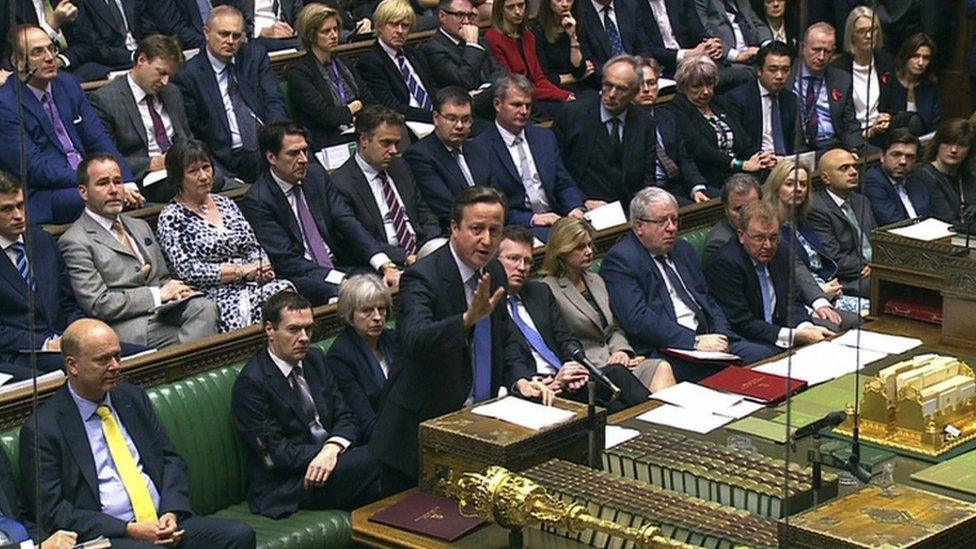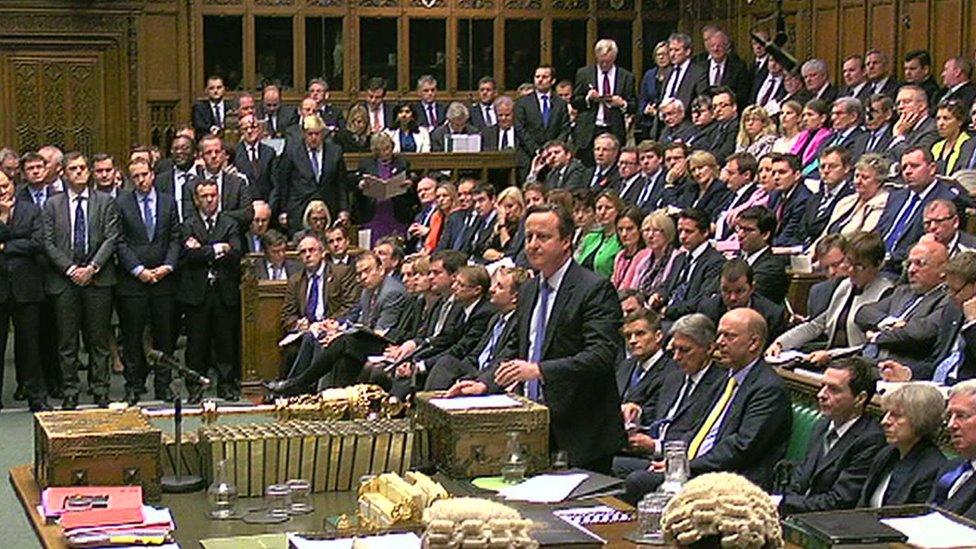Political truth and the Syria debate
- Published

Prime Minister David Cameron led the debate on military action in Syria
Discourse over the future of Syria and global terrorism inevitably creates a complex web of inter-connected issues.
That perhaps explains why the Commons debate over a proposed RAF incursion into Syria similarly generated a range of positions and standpoints which frequently straddled party political silos. Perhaps.
Equally, it is entirely possible that the complexity of the debate rather reflects the current UK political map, drawn by the May General Election but not yet delineated in full, owing to shifting allegiances and post-election efforts to gain advantage.
It remains more than likely that the Prime Minister will secure Commons support tonight for air strikes against IS in Syria - or Daesh, the semi-pejorative Arab acronym which David Cameron declared he would now use.
His core case is that IS/Daesh pose a direct threat to British security, that air strikes would lessen their capacity, that such strikes, further, would not enhance the threat on the basis that the terrorists already "attack us for what we are, not what we do."
In addition, he argues that the UK should respond positively to appeals to join collective action against IS/Daesh, that to stand aside would give them succour and that the RAF possessed precise strike capabilities which would assist the wider endeavour.
In his approach, it was possible to discern two clear tactics, one deliberate, one driven by necessity.
Tactic one - to take as many interventions from other MPs as possible. The PM plainly wanted to leave the impression that he was open to alternative ideas, that he was more than willing to listen to debate.
Tactic two - to sidestep demands for an overt apology over remarks Mr Cameron reportedly delivered to his backbench committee to the effect that those opposing air strikes included "terrorist sympathisers".
SNP MP Alex Salmond urges Prime Minister David Cameron to apologise for calling those who may vote against war "terrorist sympathisers"
The pressure for an apology was persistent. It came from a succession of SNP MPs, headed by Angus Robertson and Alex Salmond. It came from Labour - including a piece of "motherly" advice from Gisela Stuart who said that sorry would not be the hardest word and might ease tension.
The PM must have known this was coming. He had plainly decided to stand relatively firm, perhaps calculating that an outright apology would weaken his position. To be fair, he addressed it up front, arguing that there was honour in entering the Yes lobby and honour in taking the alternative course.
But he would not apologise in terms. Could he not, I wonder, have used the "honour" line - while then adding that if anyone was upset by the misinterpretation of his adlib comments, then he regretted that?
During the debate, it was a persistent meme. But there was more - much more - of substance to consider. Once again, there was evidence of shifting political sands.
Who's in charge of Labour?
For example, the Labour leader Jeremy Corbyn had a difficult time. Partly this was owing to external causes: he was harangued and barracked fairly consistently by Conservative MPs seeking to intervene. Plainly, they sensed weakness and, as is the manner of the House, they pounced.
Partly, it was internal. Mr Corbyn has reluctantly allowed a free vote on this issue to Labour MPs, following pressure from key members of his Shadow Cabinet. At its most simplistic, he is evidently not in charge of his party over this question - in that he has been unable to impose a whip.
Mr Corbyn rightly said that the issue was "serious, solemn and morally challenging". He talked of the absence of ground forces. He warned that air strikes would make matters worse. He warned of "mission creep" leading to western boots on the ground.

Jeremy Corbyn said the issue was "serious, solemn and morally challenging"
But it was not a commanding performance - perhaps partly owing to the persistent attempts at intervention. At times, Mr Corbyn appeared distracted and harassed, appealing to the Speaker for assistance.
There was a further element at play. Labour MPs, as noted earlier, protested at the Prime Minister's reported comments. But some then went on to complain of intimidation directed at them; as one put it, online and from their own party's front bench.
Then to Angus Robertson of the SNP. In terms of content and technique, this was a skilled performance by the Moray MP. Indeed, one Tory interlocutor called him "clever".
Mr Robertson reverted to the general approach adopted by his leader, Nicola Sturgeon, which was to acknowledge and praise the PM's attempt at consensus - while regretting that, ultimately, that appeal fell short.

There was, of course, a mostly unstated political element to Mr Robertson's statesmanlike approach. This was to imply that Labour had abdicated its role as the chief opposition to the Prime Minister and that it fell to the SNP to pursue that role. Naturally, Labour dissent strongly from that perspective.
Mr Robertson pursued the issue of post conflict reconstruction in Syria. But his most evident oratorical gain came via the other SNP objection; the issue of ground forces to back up air strikes.
The SNP Westminster leader reflected that the PM had said there might be 70,000 troops in Syria prepared to form a ground force against IS/Daesh - without pursuing disparate objectives of their own.
How was that figure arrived at, inquired Mr Robertson, mildly. How many of the 70,000 could be classed as moderate? How many might figure as fundamentalist?
Silent response
Mr Robertson posed the question. Then waited. And waited again. Would the PM answer? The Foreign Secretary? Anybody on the government side? Anybody at all? As the Moray MP noted, the response was silence. On the day, in the chamber, it was effective.
Eventually, of course, there came attempted rebuttals. One Tory MP accused Mr Robertson of "nit picking". Another implied the question was bogus - and invited Mr Robertson to offer his own figure. Another comment came from Dominic Grieve, who chairs the Intelligence and Security Committee - whose membership includes Mr Robertson.

According to Mr Grieve, Mr Robertson was raising "legitimate" points in his speech - but a far more salient issue was why the UK should stay out of Syria when existing interventions in Iraq were apparently proving effective.
Mr Robertson stressed the lack of political coherence in Syria - while instantly returning to his question: how many of the 70,000…..? As one Labour MP suggested the moderate quota might be around 10,000 to 15,000, Mr Robertson banked a rhetorical success.
There will, of course, be more to follow. Much more. Quite probably, military action will follow. Together with attempts, as the Prime Minister promised, to cut off funding to IS/Daesh and to pursue diplomatic solutions through the peace talks in Vienna.
From these, we may be able to approximate the truth of the situation in Syria and the concomitant terrorism. However, as today's intriguing Commons exchanges confirm, political truth is rarely pure and never simple.
- Published2 December 2015
